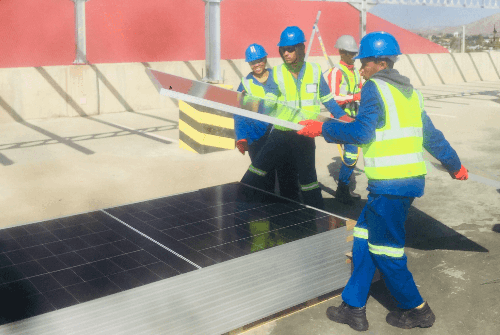Electricity Control Board (ECB) CEO Robert Kahimise yesterday advised customers to investigate more affordable and alternative energy sources to help ease the burden on national electricity usage. During the launch of the ECB’s Consumer Education Campaign, Kahimise urged consumers to contribute to self-sustainability in power generation.
“We, as the ECB, are of the view that by knowing better, a consumer can make informed choices, manage expenses better and actively contribute to a sustainable and self-sufficient electricity sector, hence this hashtag for this specific consumer education campaign,” explained the CEO.
The launch that took place in Windhoek will cover a range of initiatives, which will include educational publications, live streaming, informative posts, and social media content and interactive sessions such as podcasts.
“We are gathered here with a shared purpose to help simplify the seemingly complex electricity sector to the electricity consumer and to assist the electricity consumer to be in charge of their electricity usage and get value out of each and every electricity unit bought,” he added.
Electricity consumers, which is basically every individual and business in the country, have been experiencing electricity hikes in an already challenging economic environment.
Announcing six increases averaging at 7.7% in July 2023, Kahimise said the regulator is cognisant of the fact that the economy is depressed but said Namibia is equally dependent on reliable and affordable electricity supply.
“It is, therefore, the responsibility of the regulator to ensure a sustainable electricity industry at affordable tariffs. The ECB will continue to monitor and ensure that operational costs are contained and will put in place measures to ensure effective controls and operational efficiencies,” said Kahimise at the time.
On the campaign, the CEO said the objective is to embody the concerns of the average Namibian electricity consumer, troubled by escalating electricity costs but lacking insight into the mechanics behind these charges.
It further aims to simplify and explain the tariff determination process, the use of the National Electricity Support Tool (NEST) webtool and opportunities embedded in the Modified Single Buyer (MSB) market model.
NEST can be explained as a tool which electricity consumers can use free of charge to simulate their electricity usage and tariff in real time.
“We aim to empower and educate our consumers to understand electricity tariffs, savings, electricity usage and the way the Namibian electricity market operates. So, our commitment to the consumer is not just to inform but to transform consumer behaviour towards electricity as a commodity,” noted Kahimise.
Ongos predicament
Meanwhile, the massive Ongos Valley housing development on the northern outskirts of Windhoek has been told by the City of Windhoek to not generate its own power, this is as Ongos Velley wants to generate some of its own electricity using renewable solar energy but City has objected and legally challenged the initiative. The City of Windhoek remains adamant that Ongos should buy all its electricity from the municipality in which it operates. The City’s case against Ongos has been postponed to 4 December 2023.
Ongos Valley Development (OVD) project spokesperson, Abed Erastus, recently said the Ongos solar project would be developed employing the concept of a virtual power plant (VPP) that utilises a combination of rooftop and solar farm panels at strategic locations at Ongos Valley.
A VPP is a network of decentralised generation or storage units. This could range from wind farms to rooftop solar and battery storage.
“Our only intention is generating a portion of our electricity needs using the abundant sunshine that our nation has been blessed with. The City of Windhoek remains a key stakeholder in our development and will continue to do so indefinitely. We aim to become one of the first green city developments in Southern Africa,” said Erastus.
On the other hand, the City is fighting in court for a review of the solar power project approval Ongos received from energy minister Tom Alweendo. The minister apparently granted OVD permission to operate within the City’s electricity distribution and supply licences.
According to court documents, Alweendo wrote a letter to the City, requesting it to indicate its preferred option, where the minister offered two options. This includes allowing OVD to distribute electricity under its licences or alternatively the City should agree to compensate OVD for its electricity infrastructure development costs.
Second respondent to the City’s legal challenge, the ECB, last year communicated that OVD received approval from the energy ministry to operate its solar power plant within the city.


